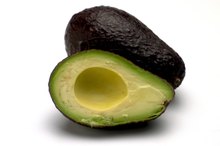Essential Fatty Acids in Avocados
The avocado, a fatty tropical fruit known for its buttery texture and mild flavor, is a popular component of healthy cuisine throughout the world. In addition to supplying folate, potassium, vitamin C and several other important nutrients, an avocado is an excellent source of essential fatty acids. Those consuming a restricted or vegan diet can benefit from the use of avocado to supply these critical compounds. However, its nutritional profile is not ideal for people eating a conventional American diet.
Alpha-Linolenic Acid
According to NutritionData.com, a 1-cup serving of avocado contains 253 milligrams of alpha-linolenic acid, an omega-3 fatty acid 1. This essential fatty acid offers several important benefits for the heart, joints and central nervous system. However, avocados contain a fairly small amount compared to a person's total need for the compound.
- According to NutritionData.com, a 1-cup serving of avocado contains 253 milligrams of alpha-linolenic acid, an omega-3 fatty acid 1.
- This essential fatty acid offers several important benefits for the heart, joints and central nervous system.
Linoleic Acid
Avocado & the Liver
Learn More
One serving of avocado contains a generous 3886 milligrams of linoleic acid, an omega-6 fatty acid. This essential fatty acid, found in most high-fat foods, enables many essential functions within the human body. However, nutritionists warn that most Americans get too much of this important compound, not too little. Nevertheless, the fats found in avocado are predominantly monounsaturated and present a healthier alternative to cheeses and butters.
- One serving of avocado contains a generous 3886 milligrams of linoleic acid, an omega-6 fatty acid.
- Nevertheless, the fats found in avocado are predominantly monounsaturated and present a healthier alternative to cheeses and butters.
Oleic Acid
Avocados contain oleic acid, a monounsaturated omega-9 fatty acid also found in olive oil. In April 2009, the BBC reported that this healthy fat compound can enhance memory and brain activity; early evidence also suggests that it may improve cholesterol levels.
Related Articles
References
- Nutritiondata.com: Avocado
- World's Healthiest Foods: Avocado
- BBC News: Fatty Foods Offer Memory Boost
- Carvajal-zarrabal O, Nolasco-hipolito C, Aguilar-uscanga MG, Melo santiesteban G, Hayward-jones PM, Barradas-dermitz DM. Effect of dietary intake of avocado oil and olive oil on biochemical markers of liver function in sucrose-fed rats. Biomed Res Int. 2014;2014:595479. doi: 10.1155/2014/595479
- Del toro-equihua M, Velasco-rodríguez R, López-ascencio R, Vásquez C. Effect of an avocado oil-enhanced diet (Persea americana) on sucrose-induced insulin resistance in Wistar rats. J Food Drug Anal. 2016;24(2):350-357. doi: 10.1016/j.jfda.2015.11.005
- Muth, Natalie Dugate, MD, MPH, RD, CSSD, FAAP. Sports Nutrition for Health Professionals F.A. Davis Company. 2015
- Thalheimer, Judith C. RD, LDN, RD, LDN Heart-Healthy Oils: They're Not All Created Equal. Today's Dietitian. Vol. 17 No. 2 P. 24 February 2015
- Vannice, Gretchen, and Heather Rasmussen. “Position of the Academy of Nutrition and Dietetics: Dietary Fatty Acids for Healthy Adults.” Journal of the Academy of Nutrition and Dietetics 114.1 (2014): 136–153. doi: 10.1016/j.jand.2013.11.001
Writer Bio
Juniper Russo, an eclectic autodidact, has been writing professionally since 2008. Her work has appeared in several online and print-based publications, including Animal Wellness. Russo regularly publishes health-related content and advocates an evidence-based, naturopathic approach to health care.









